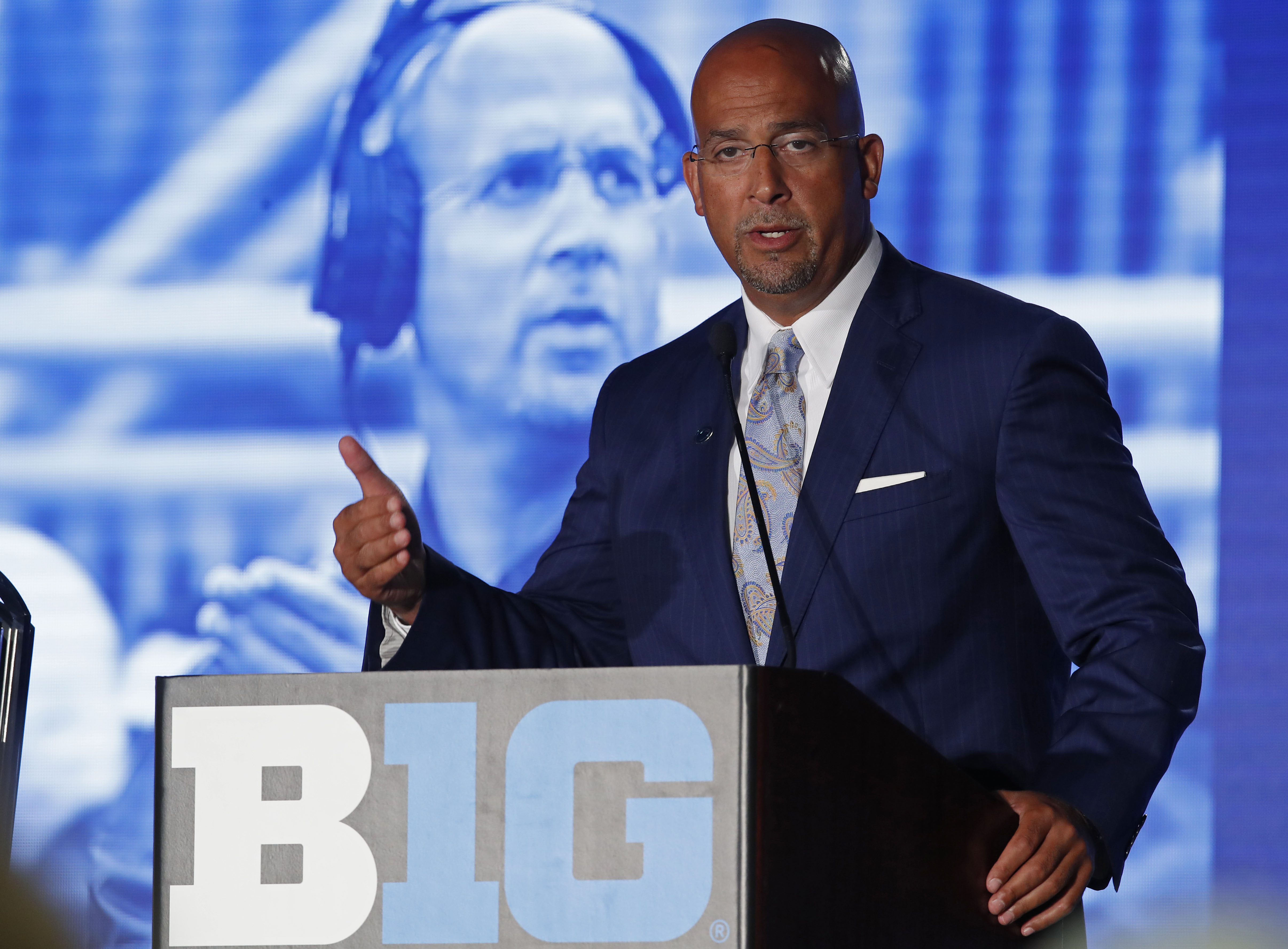Ad Disclosure

How the B1G can use nine conference games, strength of schedule to help its College Football Playoff chances
Chicago — The conversation about the B1G’s nine-game conference schedule has become as common of the expansion of the College Football Playoff. It’s no coincidence that the two discussions spur one another.
It happened again at B1G Media Days last week.
The question was simple — with the B1G missing the College Football Playoff each of the past two seasons, what’s wrong with the system? The answers were a little more complicated.
Questions about the College Football Playoff — and the B1G’s absence from it — fueled comments about the conference’s nine-game league schedule. Penn State’s James Franklin and Northwestern’s Pat Fitzgerald were the most outspoken in Chicago.
“I think the nine conference games is something that needs to be discussed,” Franklin said. “When you play nine conference games, you’re going to have more losses within your conference. I think all of these things need to be discussed after the last two years and what’s happened.”
Fitzgerald offered a similar sentiment.
“I think the nine league games is great for our fans, I think it’s great for our guys from a competitive standpoint,” Fitzgerald said. “But, to me, to have a true champion, we have to have the same data points. Until we do that, it’s not any different than it was in the BCS. It’s just a different name.”

The frustration from both coaches was visible. Franklin seems to be in favor of dropping the number of conference games back down to eight. Fitzgerald wants a level playing field across college football. Both make great points.
As much sense as Franklin and Fitzgerald might make, though, it’s likely that their voices won’t be heard. Not for awhile, anyway. There’s a pretty good reason why.
Money.
The SEC might be college football’s king in terms of College Football Playoff appearances and national championships, but the B1G is the Scrooge McDuck of college athletics, swimming in a safe full of $100 bills and gold coins. By striking megadeals with FOX and ESPN, Jim Delany positioned the B1G to be the most profitable league in sports.
It’s worked. For the 2018 fiscal year, the B1G raked in nearly $759 million, a cool $100 million more than the SEC brought in for the year. Nobody is complaining about that check, even if it costs the B1G a bid in the College Football Playoff occasionally.
Part of what made the B1G so appealing was the push to a nine-game conference schedule and swerving away from playing FCS opponents. Essentially, the change in scheduling has added two more attractive games for all 14 teams.

The B1G took the money instead of helping its case for the College Football Playoff on a yearly basis. And, as Delany even said during B1G Media Days, there’s not much traction for the conference to back away from its nine-game schedule.
On that front, Franklin and Fitzgerald are fighting a losing battle.
Where the two coaches — and the rest of the B1G leaders — could make progress, though, is for the College Football Playoff selection committee to weigh strength of schedule and conference championships heavier in the process. Franklin and Fitzgerald already share similar thoughts on that, as well.
“I think the hard part with that is the set of criteria that you’ve been told are gonna impact being able to make the playoff — strength of schedule, things like that,” Franklin said. “There’s a lot of variables there. There’s a lot of things you can’t control.”
Once again, Fitzgerald agreed with his conference counterpart.
“Until we get to a point where everybody that plays Power Five football, and/or Division I football, plays the same amount of conference games, and we put the strength of schedule and the value back on being a conference champion as the two components as the most important, I think we’re going to continue to have [issues],” Fitzgerald said.
It seems like an impossible task to get a selection committee to change the way it views strength of schedule and conference championships, but it’s not something the B1G has to take on alone. The Pac-12 and Big 12 also have nine-game league schedules. Those would be some pretty good strong drafting partners.
But how could a conference make that kind of impact? Squeaky wheel gets the grease, right?

As much as we tire of hearing how the SEC is the king of college football, its head coaches do a phenomenal job of promoting the league. All 14 continually talk about the strength of conference during nearly every podium visit, as if they’ve been programmed to do so. In five years, it’s one of just two conferences not to be left out of the College Football Playoff (ACC) and is the only league to have two teams in the same field (Georgia & Alabama, 2017).
The B1G isn’t nearly the car salesman the SEC has become. It’s been content to take the politically correct route, playing the “we’ll see what happens” game. Meanwhile, the SEC filibusters for its league and its teams.
It’s not a bad approach for the B1G to follow.
B1G coaches are just now starting to attack the selection committee’s selection process. The criteria seems to change on an annual basis. What weighs most heavily one year doesn’t always translate to the next.
Franklin and Fitzgerald — and probably every other B1G coach — wants to establish a set criteria. If schedule strength and conference championships can be the emphasis, the conference will undoubtedly benefit.
“We need to have discussions,” both coaches said in Chicago.
Franklin and Fitzgerald got the ball rolling. It’s up to other coaches, and other leagues, to jump in on the conversation.
Dustin grew up in the heart of Big Ten country and has been in sports media since 2010. He has been covering Big Ten football since 2014. You can follow him on Twitter: @SchutteCFB